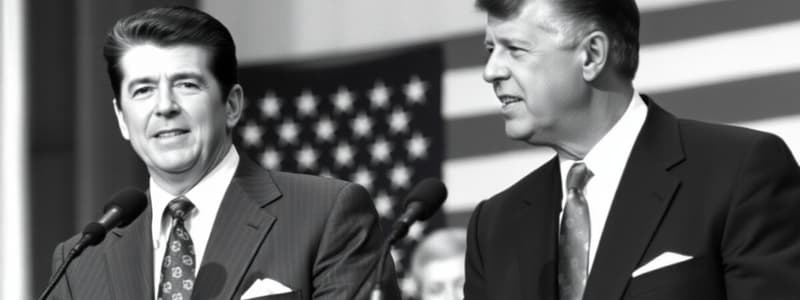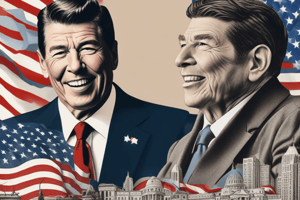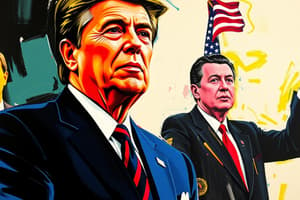Podcast
Questions and Answers
Who was the incumbent president running for re-election in 1980?
Who was the incumbent president running for re-election in 1980?
- Ted Kennedy
- Jimmy Carter (correct)
- Ronald Reagan
- George H.W. Bush
Which political party did Ronald Reagan represent in the 1980 presidential election?
Which political party did Ronald Reagan represent in the 1980 presidential election?
- Libertarian Party
- Socialist Party
- Republican Party (correct)
- Democratic Party
Who was Ronald Reagan's running mate in the 1980 presidential election?
Who was Ronald Reagan's running mate in the 1980 presidential election?
- Walter Mondale
- George H.W. Bush (correct)
- Patrick Lucey
- David Koch
Who was Jimmy Carter's running mate in the 1980 election?
Who was Jimmy Carter's running mate in the 1980 election?
What was the name of the independent candidate who ran in the 1980 election?
What was the name of the independent candidate who ran in the 1980 election?
Which of the following was not a major primary candidate for the Republican nomination in 1980?
Which of the following was not a major primary candidate for the Republican nomination in 1980?
What was the slogan used by Reagan and Bush during their 1980 campaign?
What was the slogan used by Reagan and Bush during their 1980 campaign?
In the 1980 election, what percentage of the popular vote did Jimmy Carter win?
In the 1980 election, what percentage of the popular vote did Jimmy Carter win?
What was a major factor that contributed to Jimmy Carter's struggles in the 1980 election?
What was a major factor that contributed to Jimmy Carter's struggles in the 1980 election?
Which economic concept did Reagan use to appeal to the public during his campaign?
Which economic concept did Reagan use to appeal to the public during his campaign?
Flashcards
1980 Presidential Election
1980 Presidential Election
U.S. presidential election held on November 4, 1980, where Republican Ronald Reagan challenged incumbent Democrat Jimmy Carter.
Ronald Reagan
Ronald Reagan
The Republican candidate and winner of the 1980 Presidential Election; his running mate was George H.W. Bush.
Running Mate
Running Mate
In U.S. presidential elections, this term refers to the vice-presidential candidate associated with a presidential candidate.
Jimmy Carter
Jimmy Carter
Signup and view all the flashcards
Misery Index
Misery Index
Signup and view all the flashcards
Carter's Malaise Speech
Carter's Malaise Speech
Signup and view all the flashcards
Reagan Nomination
Reagan Nomination
Signup and view all the flashcards
Carter-Reagan Debate
Carter-Reagan Debate
Signup and view all the flashcards
The New Right
The New Right
Signup and view all the flashcards
Reaganomics
Reaganomics
Signup and view all the flashcards
Study Notes
The 1980 Presidential Election
- The election occurred on November 4, 1980.
- Ronald Reagan, the Republican candidate, defeated incumbent Jimmy Carter, the Democratic candidate.
Candidates
- Besides Reagan and Carter, candidates from the Libertarian, Socialist, Citizens, and Socialist Worker parties also ran.
- John B. Anderson, a Republican, ran as an independent candidate.
Ronald Reagan's Candidacy
- George H. W. Bush was Reagan's running mate; together, they campaigned under the slogan ''Let's make America great again.''
Jimmy Carter's Candidacy
- Walter Mondale was Carter's running mate, displaying a firm and trusting relationship.
- Carter faced attacks from Republicans, third parties, and even within his own party.
Other Candidates
- John B. Anderson (Independent) had Patrick Lucey as his running mate.
- Ed Clark (Libertarian Party) ran with David Koch.
- David McReynolds (Socialist Party) chose Sister Diane Drufenbrock, marking the first openly gay presidential candidate and the first nun vice-presidential candidate.
- Barry Commoner (Citizens Party) ran with LaDonna Harris.
- Gus Hall (Communist Party) chose Angela Davis as his running mate.
- Clifton DeBerry (Socialist Workers Party) had Matilde Zimmermann as his running mate.
- John Richard Rarick (American Independent Party) ran with Eileen Shearer.
- Maureen Smith (Peace and Freedom Party) chose Elizabeth Cervantes Barron as her running mate.
Democratic Party Primaries
- Carter faced primary challenges due to perceptions of ineffectiveness, attributed to his handling of the energy crisis.
- Higher interest rates and a recession in 1980 were blamed on actions taken by Carter's appointees to the Federal Reserve Board.
- Senator Edward ''Ted'' Kennedy was Carter's most significant challenger, showing antagonism even through the Democratic National Convention.
- Despite Kennedy winning some later primaries, Carter's prominence was indisputable, securing him the nomination after Kennedy withdrew.
Republican Party Primaries
- Primary candidates included Ronald Reagan, Bob Dole, and George H. W. Bush.
- Key issues debated were economics, defense strategy, and government funding.
- Bush initially gained ground, but support shifted towards Reagan; interactions between Bush and Reagan were very tense.
- Reagan received the Republican nomination in May 1980, choosing Bush as his running mate.
1980 Presidential Election in Context
- Jimmy Carter faced low approval ratings.
Reagan Campaign
- The campaign attracted those seeking change, agreeing with Reagan's policies, or aligning with the New Right movement (including the Moral Majority).
- Reaganomics proposed reducing welfare spending, decreasing taxes, deregulating the economy, and increasing military funding.
- Reagan opposed political proposals related to women and minority civil rights, particularly the Equal Rights Amendment.
- Reagan used the ''Misery Index''—the sum of inflation and unemployment rates—to highlight economic distress and blame Carter's policies.
Carter's Malaise Speech
- Carter's 1979 speech stated that Americans were too materialistic and faced a "crisis of confidence."
- Initial positive reactions were followed by a backlash after Carter fired his cabinet, which inspired Ted Kennedy to run against him.
Carter-Reagan Debate
- The televised debate was a turning point, with Reagan's statements and quips seen favorably compared to Carter's difficulties.
1980 Presidential Election Results
- Reagan won by a landslide with 489 electoral votes to Carter's 49, which is one of the largest landslide victories in American history.
- Reagan won just over 50% of the popular vote, Carter won 41%, and John B. Anderson won 6.6%.
Studying That Suits You
Use AI to generate personalized quizzes and flashcards to suit your learning preferences.




